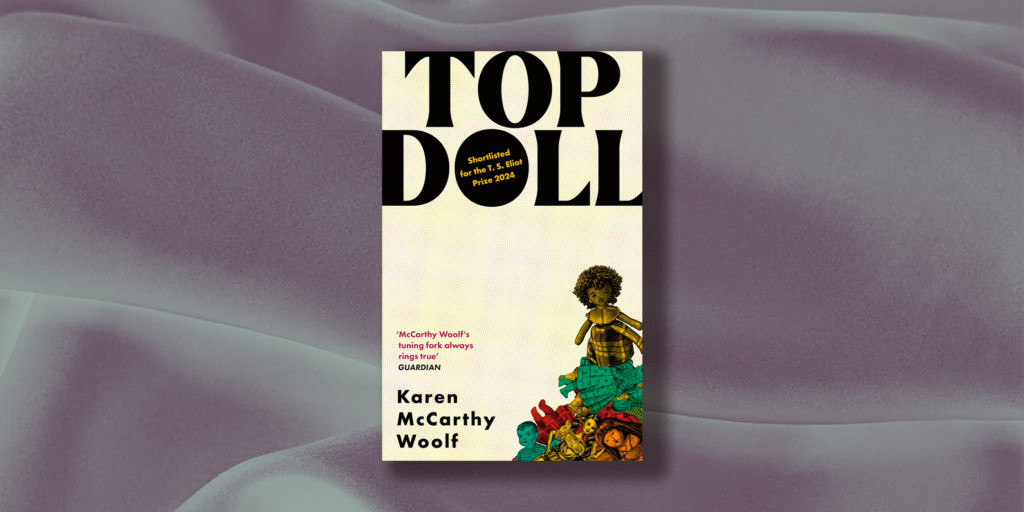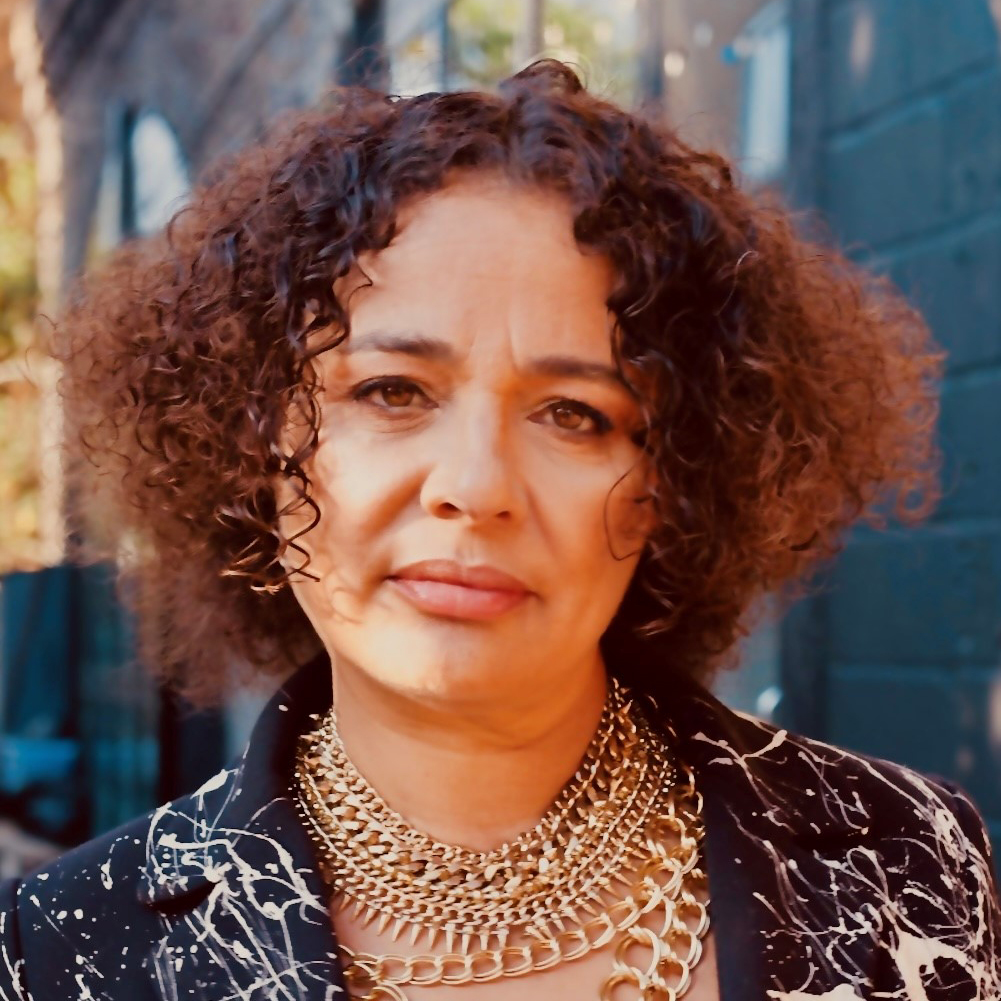Welcome to our Writers’ Notes for the 2024 T.S. Eliot Prize shortlist. These are educational resources for poets looking to develop their practice and learn from some of contemporary poetry’s most exciting and accomplished voices. Here’s Karen McCarthy Woolf on her book Top Doll.

Top Doll took me the best part of a decade to complete, so over that period, I might call it an era even, there were many different approaches to my writing practice that came into play. There was the before-external-deadlines-era, when the only person truly waiting for the next instalment was me. That was probably the hardest period. The time when I almost gave up the ghost.
Writing the Dolls’ Eye View
Actually, ghost is a key word: or doll. Because once I was in the game, I felt a strange, but tangible duty towards the dolls and the more-than-human, spiritual realms they inhabit and embody. After a while, the character becomes ‘real’, even if they’re imaginary. There’s a sense of moral obligation, to an accuracy that resides not so much in event, but in the authentic truth of their arc and utterance. If it didn’t ‘feel’ right, then I’d try to honour that gut instinct. Poetic form is a great test of that: if the poems don’t fit the form, or bends its architecture too far out of shape, then there’s most likely going to be a diagnostic issue that relates to the content. That’s the beauty: form is as much an editing tool as it is an aid in early drafts.
Top Doll is what I describe as a deeply unreliable biography/polyvocal verse novel. The book blurs fact and fiction in its rendition of the story of its real-life protagonist Huguette Clark, a billionaire recluse who lived with her vast collection of antique dolls in a 42-room New York apartment she barely stepped outside of for 60 years. I tell her story from the dolls’ perspective. The dolls were cooped up for so long, and once I let them loose, they had a lot to say.
Loyal to the Voice
How they say what they have to say was a very organic process. Dolly, who may or may not be ‘top doll’, speaks in sonnets, and most usually in sonnet coronas. I wrote at least ten of these throughout the process, as I was exploring her character trajectory and voice. It was a lot of work, and a lot of darlings got killed when I axed about eight of them. It felt good though. What propelled that decision was the realisation that my real loyalty was to the character, to the story, and most specifically, voice.
It made sense, that Dolly who is hyper-theatrical, almost hysterical and definitely hyperbolic, would speak in this diminutive sing-song, and those sonnets emerged as the formal vehicle early on. Also, due to various matters of biography, she is half-French, so I decided I wanted to create this doll/French hybrid language. I fed lines of the sonnets into Google Translate which duly churned out lines of highly dubious French, which I then fed back in to get English. The result was a messy grammatical disruption through which I was able to get a feel for a newly chaotic syntax. The rhyme, actually, was easier, because of being able to work in two languages. In the end I eased off on the French because the reader already has a lot of work to do with the non-linear, ‘prismatic’ structure, which distorts numerous time frames as we follow several stories from multiple and sometimes contradictory perspectives.
Barbie as Archetype
For this book I did a lot of historical research whether it was reading about what life was like for Black and indigenous people during the American Civil War and the settlement of the West, discovering which tunes the DJ would have been spinning in a New York discotheque in 1991, or which Barbies existed at that moment in time. All of the Barbies in the book speak in the Abecedary form, which is actually very old, and dates back to the illuminated manuscript. That seems slightly counterintuitive, but Barbies are an archetype, and the set, childlike nature of that form suited their collective role as a literary chorus perfectly.
The Barbies were a lot of fun to write and a means by which to offer a satirical critique of capitalism. I think that humour really helped me do that. I always want my poetry to operate within a framework of witness and the book speaks directly and in more oblique ways to white fragility, both through the characters that embrace it, and those who reject it. Dolly, as a highly valued, porcelain antique is most emblematic of that sociocultural trope. The General – an African-American ragdoll, who is writing his memoirs, does so in highly stylised, intellectual terms, whereas Miss Ting, whose poetic monologues are in Jamaican patois, is more forthright in her criticisms.
The External Eye
Most of my drafts are shared with trusted readers. Sometimes these might be friends and family, but most consistently I workshop poems with poet peers. I have a long-standing seminar group and we’ve worked together for many years, and know each other’s poetics, strengths and foibles. I always advise my students to try and have a similar community, as an external eye on the work is invaluable. My agent and editor both gave excellent notes, particularly on larger matters of narrative arc and storyline, but I want the basics to be firmly in place before sending anything out. It’s hard always to know when something’s ready, but a long-standing reader who knows you and your work will help you make that call.
A Lived Paradox
Usually, my poetry is in conversation with the natural world, with the elements and environment. It’s very rooted in a lived materiality. It therefore seemed fitting that Lady Mamiko, a Japanese porcelain doll, uses haibun. Haiku is characterised not just by its economy, but also by the kigo, the seasonal reference, which roots the poems in time and place. For me there was a poignancy in the fact that she is the character who most wants to go outside, so we feel that yearning emerge through the haikus that are interspersed through the poetic prose.
There was a strange sense of lived paradox too. I wrote Top Doll as a side project: my commitment as a writer and doctoral, then postdoctoral researcher, concerns ‘sacred hybridity’ as a means by which to read ecological poems from a global majority perspective – something that felt very different. At the moment I’m writing lots of poems and lyric essays that take the reader away from gilded interiors outside in the open air again. I’m excited by what that might reveal.
The Poetry School and T.S. Eliot Foundation have long collaborated on celebrating the T.S. Eliot Prize shortlist, highlighting this major fixture in the poetry calendar as a fantastic way into the art form and an opportunity to learn from poets at the top of their craft. This year we have a series of Writers’ Notes from the shortlisted poets, alongside a special one-off course with the fabulous Rachel Long, specifically focused on reading and writing after the shortlisted book, Adam by Gboyega Odubanjo.

Karen McCarthy Woolf FRSL, shortlisted for the T. S. Eliot Prize 2024 for Top Doll (Dialogue Books), was born in London to English and Jamaican parents. She is the author of three poetry books and the editor of numerous literary anthologies. As a postdoctoral Fulbright Scholar at UCLA, she was writer in residence at the Promise Institute for Human Rights. Her debut An Aviary of Small Birds (Carcanet Press, 2014), was an Observer Book of the Year and her second collection, Seasonal Disturbances (Carcanet Press, 2017), was a winner in the Laurel Prize. McCarthy Woolf has performed her work worldwide – in the US, Caribbean, Asia and across Europe at venues including the Royal Festival Hall, Barbican and Kings Place for Poetica Electronica, which showcased music collaborations with various dance and techno producers. Her poems have been translated into Turkish, Swedish, Spanish, Polish and Dutch, produced as an animated and choreographed short film, exhibited by Poems on the Underground and dropped from a helicopter over the Houses of Parliament. She was awarded a 2024 Jerwood Poetry Award by the Royal Society of Literature. Photo © Yasmine Akim
Add your Reply
You must be logged in to post a comment.